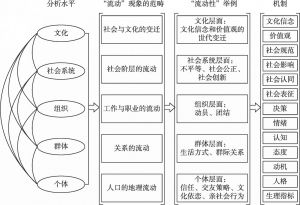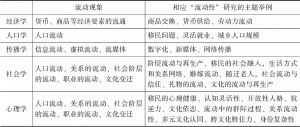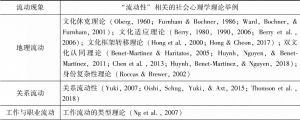论文
流动社会的流动之心:社会心理学视角下的流动性研究(代卷首语)
摘要
在心理学的学科范畴中,“流动性”是指人们在各类社会流动过程中的心理和行为特征,也称“心理流动性”,可反映在个体、群体、组织、社会系统和文化等多个层次及其相互关系上。长期以来,社会心理学都不乏对“流动性”问题的关注,但由于这些研究散落在不同的研究脉络之下,因而“流动性”研究并未成为一个专门化的领域。然而,社会流动已然成为人们生活的常态,许多新的社会现象和社会问题随之不断涌现,这亟待从心理学擅长的微观层面予以检视,进而推进流动性各个层面相互作用机理的研究。在此背景下,本文首先总结了“流动性”研究在主题、理论和研究范式上的发展现状,并提出应通过不断拓展边界,实现社会心理学对“流动性”问题的学科关切;其次,介绍了本辑收录的11篇论文,分析这些研究之于社会心理建设的意义,并就如何将心理学研究与社会治理的场景进行衔接进行了讨论;最后,结合近年来一些突出的社会现象,对未来的“流动性”研究做出展望。
作者
陈咏媛 ,中国社会科学院社会发展战略研究院助理研究员。
谢天 ,武汉大学哲学学院心理学系副教授、硕士生导师。
杨宜音 ,哈尔滨工程大学人文社会科学学院教授、博士生导师。
Chen Yongyuan
Xie Tian
Yang Yiyin
检索正文关键字
论文目录
-
一 “流动性”研究中的主题、理论和研究范式
- (一)流动性:概念、主题及其边界的延展
- (二)流动性研究的理论:边界的延展
- (三)流动性研究的范式及其边界的延展
-
二 社会心理建设:“流动性”研究下的几类议题
- (一)地理流动
- 1.流动的老人与“回不去”的故乡
- 2.流动的中青年:焦虑与秩序
- 3.流动的儿童与变迁的价值观
- (二)关系流动
- (三)工作与职业流动
- (四)社会与文化变迁
- (一)地理流动
- 三 余论:从社会流动到“心理流动性”研究
相关文献
查看更多>>>





